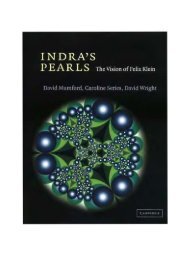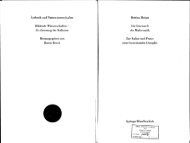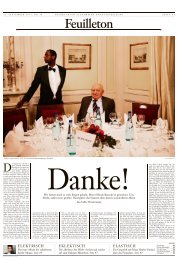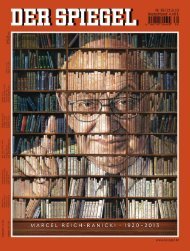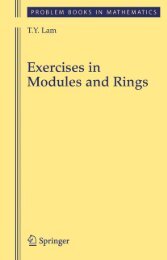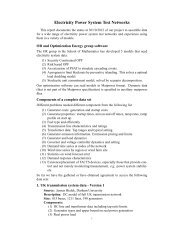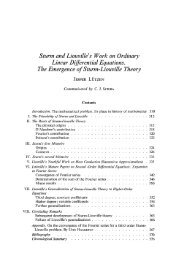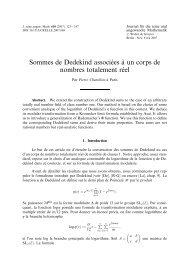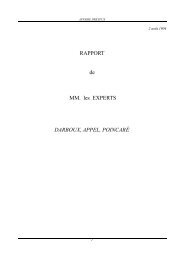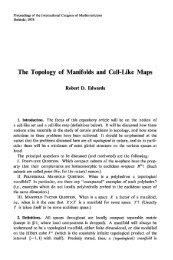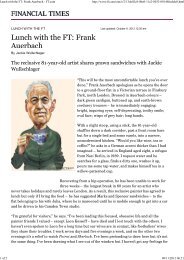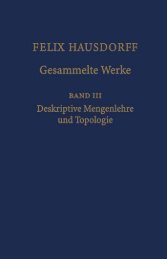- Page 1 and 2:
P. HISTORY OF ' AATHEMATICAL ound A
- Page 3 and 4:
A HISTORY OF MATHEMATICAL NOTATIONS
- Page 5:
PREFACE The study of the history of
- Page 8 and 9:
... vln TABLE OF CONTENTS Byzantine
- Page 10 and 11:
TABLE OF CONTENTS mx.&amms Notation
- Page 12 and 13:
TABLE OF CONTENTS PIRAQRAPER Crosse
- Page 14 and 15:
ILLUSTRATIONS PIQUBE 28 . REAL ESTA
- Page 16 and 17:
PIOURE 91 . RADICALS ILLUSTRATIONS
- Page 18 and 19:
NUMERAL SYhlBOLS AND COMBINATIONS '
- Page 20 and 21:
4 A HISTORY OF MATHEMATICAL NOTATIO
- Page 22 and 23:
6 A HISTORY OF MATHEMATICAL NOTATIO
- Page 24 and 25:
8 A HISTORY OF MATHEMATICAL NOTATIO
- Page 26 and 27:
10 A HISTORY 6F' MATHEMATICAL NOTAT
- Page 28 and 29:
12 A HISTORY OF MATHEMATICAL NOTATI
- Page 30 and 31:
14 A HISTORY OF MATKEMATICAL NOTATI
- Page 32 and 33:
16 A HISTORY OF MATHEMATICAL NOTATI
- Page 34 and 35:
18 A HISTORY OF MATHEMATICAL KOTATI
- Page 36 and 37:
20 A HISTORY OF MATHEMATICAL NOTATI
- Page 38 and 39:
22 A HISTORY OF MATHEMATICAL NOTATI
- Page 40 and 41:
24 A HISTORY OF MATHEMATICAL NOTATI
- Page 42 and 43:
26 A HISTORY OF MATHEMATICAL NOTATI
- Page 44 and 45:
28 A HISTORY OF MATHEMATICAL NOTATI
- Page 46 and 47:
30 A HISTORY OF MATHEMATICAL NOTATI
- Page 48 and 49:
32 A HISTORY OF MATHEMATICAL NOTATI
- Page 50 and 51:
34 A HISTORY OF MATmMATICAL NOTATIO
- Page 52 and 53:
36 A HISTORY OF MATHEMATICAL NOTATI
- Page 54 and 55:
38 A HISTORY OF MATHEMATICAL NOTATI
- Page 56 and 57:
40 A HISTORY OF MATHEMATICAL NOTATI
- Page 58 and 59:
42 A HISTORY OF MATHEMATICAL NOTATI
- Page 60 and 61:
44 A HISTORY OF MATHEMATICAL NOTATI
- Page 62 and 63:
A HISTORY OF MATHEMATICAL NOTATIONS
- Page 64 and 65:
48 A HISTORY OF MATHEMATICAL NOTATI
- Page 66 and 67:
50 A HISTORY OF MATHEMATICAL NOTATI
- Page 68 and 69:
52 A HISTORY OF MATHEMATICAL NOTATI
- Page 70 and 71:
34 A HISTORY OF MATHEMATICAL NOTATI
- Page 72 and 73:
- 56 A HISTORY OF MATHEMATICAL NOTA
- Page 74 and 75:
58 A HISTORY OF MATHEMATICAL NOTATI
- Page 76 and 77:
60 A HISTORY OF MATHEMATICAL NOTATI
- Page 78 and 79:
62 A HISTORY OF MATHEMATICAL NOTATI
- Page 80 and 81:
64 A HISTORY OF MATHEMATICAL NOTATI
- Page 82 and 83:
66 A HISTORY OF MATHEMATICAL NOTATI
- Page 84 and 85:
68 A HISTORY OF MATHEMATICAL NOTATI
- Page 86 and 87:
70 A HISTORY OF MATHEMATICAL NOTATI
- Page 88 and 89:
72 A HISTORY OF MATHEMATICAL NOTATI
- Page 90 and 91:
74 A HISTORY OF MATHEMATICAL NOTATI
- Page 92 and 93:
76 A HISTORY OF MATHEMATICAL NOTATI
- Page 94 and 95:
78 A HISTORY OF MATHEMATICAL NOTATI
- Page 96 and 97:
80 A HISTORY OF MATHEMATICAL NOTATI
- Page 98 and 99:
82 A HISTORY OF MATmMATICAL NOTATIO
- Page 100 and 101:
84 A HISTORY OF MATHEMATICAL NOTATI
- Page 102 and 103:
86 A HISTORY OF MATHEMATICAL NOTATI
- Page 104 and 105:
88 A HISTORY OF MATHEMATICAL NOTATI
- Page 106 and 107:
90 A HISTORY OF MATHEMATICAL NOTATI
- Page 108 and 109:
92 A HISTORY OF MATHEMATICAL NOTATI
- Page 110 and 111:
94 A HIETORY OF MATHEMATICAL NOTATI
- Page 112 and 113:
96 A HISTORY OF MATHEMATICAL NOTATI
- Page 114 and 115:
38 A HISTORY OF MATHEMATICAL NOTATI
- Page 116 and 117:
100 A HISTORY OF MATHEMATICAL NOTAT
- Page 118 and 119:
102 A HISTORY OF MATHEMATICAL NOTAT
- Page 120 and 121:
104 A HISTORY OF MATHEMATICAL NOTAT
- Page 122 and 123:
106 A HISTORY OF MATHEMATICAL NOTAT
- Page 124 and 125:
108 A HISTORY OF MATHEMATICAL NOTAT
- Page 126 and 127:
110 A HISTORY OF MATHEMATICAL NOTAT
- Page 128 and 129:
112 A HISTORY OF MATHEMATICAL NOTAT
- Page 130 and 131:
114 A HISTORY OF MATHEMATICAL NOTAT
- Page 132 and 133:
116 A HISTORY OF MATHEMATICAL NOTAT
- Page 134 and 135:
118 A HISTORY OF MATHEMATICAL NOTAT
- Page 136 and 137:
120 A HISTORY OF MATHEMATICAL NOTAT
- Page 138 and 139:
122 A HISTORY OF MATHEMATICAL NOTAT
- Page 140 and 141:
124 A HISTORY OF MATHEMATICAL NOTAT
- Page 142 and 143:
126 A HISTORY OF MATHEMATICAL NOTAT
- Page 144 and 145:
128 A HISTORY OF MATHEMATICAL NOTAT
- Page 146 and 147:
130 A HISTORY OF MATHEMATICAL NOTAT
- Page 148 and 149:
132 A HISTORY OF MATHEMATICAL NOTAT
- Page 150 and 151:
134 A HISTORY OF MATHEMATICAL NOTAT
- Page 152 and 153:
136 A HISTORY OF MATHEMATICAL NOTAT
- Page 154 and 155:
138 A HISTORY OF MATHEMATICAL NOTAT
- Page 156 and 157:
140 A HISTORY OF MATHEMATICAL NOTAT
- Page 158 and 159:
142 A HISTORY OF MATHEMATICAL NOTAT
- Page 160 and 161:
144 A HISTORY OF MATHEMATICAL NOTAT
- Page 162 and 163:
146 A HISTORY OF MATHEMATICAL NOTAT
- Page 164 and 165:
148 A HISTORY OF MATHEMATICAL NOTAT
- Page 166 and 167:
150 A HISTORY OF MATHEMATICAL NOTAT
- Page 168 and 169:
152 A HISTORY OF MATHEMATICAL NOTAT
- Page 170 and 171:
154 A HISTORY OF MATHEMATICAL NOTAT
- Page 172 and 173:
156 A HISTORY OF MATHEMATICAL NOTAT
- Page 174 and 175:
158 A HISTORY OF MATHEMATICAL NOTAT
- Page 176 and 177:
160 A HISTORY OF MATIIEMATICAL NOTA
- Page 178 and 179:
162 A HISTORY OF MATHEMATICAL NOTAT
- Page 180 and 181:
164 A HISTORY OF MATHEMATICAL NOTAT
- Page 182 and 183:
166 A HISTORY OF MATHEMATICAL NOTAT
- Page 184 and 185:
168 A HISTORY OF MATHEMATICAL NOTAT
- Page 186 and 187:
170 A HISTORY OF MATHEMATICAL NOTAT
- Page 188 and 189:
172 A HISTORY OF MATHEMATICAL NOTAT
- Page 190 and 191:
174 A HISTORY OF MATHEMATICAL NOTAT
- Page 192 and 193:
176 A HISTORY OF MATEFEMATICAL NOTA
- Page 194 and 195:
178 A HISTORY OF MATHEMATICAL NOTAT
- Page 196 and 197:
180 A HISTORY OF MATHEMATICAL NOTAT
- Page 198 and 199:
182 A HISTORY OF MATREMATICAL NOTAT
- Page 200 and 201:
if54 A HISTORY OF MATHEMATICAL NOTA
- Page 202 and 203:
186 A HISTORY OF MATHEMATICAL NOTAT
- Page 204 and 205:
188 A HISTORY OF MATHEMATICAL NOTAT
- Page 206 and 207:
' 1652 190 A HISTORY OF MATHEMATICA
- Page 208 and 209:
......................... 192 A HIS
- Page 210 and 211:
194 A HISTORY OF MATHEMATICAL NOTAT
- Page 212 and 213:
196 A HISTORY OF ,MATHEMATICAL NOTA
- Page 214 and 215:
198 A HISTORY OF MATHEMATICAL NOTAT
- Page 216 and 217:
200 A HISTORY OF MATHEMATICAL 'NOTA
- Page 218 and 219:
202 A HISTORY OF MATHEMATICAL NOTAT
- Page 220 and 221:
204 A HISTORY OF MATHEMATICAL NOTAT
- Page 222 and 223:
A HISTORY OF MATHEMATICAL NOTATIONS
- Page 224 and 225:
208 A HISTORY OF MATHJ3MATICAL NOTA
- Page 226 and 227:
210 A HISTORY OF MATHEMATICAL NOTAT
- Page 228 and 229:
212 A HISTORY OF MATHEMATICAL NOTAT
- Page 230 and 231:
214 A HISTORY OF MATHEMATICAL NOTAT
- Page 232 and 233:
216 ,A HISTORY OF MATHEMATICAL NOTA
- Page 234 and 235:
218 A HISTORY OF MATHEMATICAL NOTAT
- Page 236 and 237:
no A HISTORY OF MATHEMATICAL NOTATI
- Page 238 and 239:
322 A HISTORY OF MATHEMATICAL NOTAT
- Page 240 and 241:
224 A HISTORY OF MATHEMATICAL NOTAT
- Page 242 and 243:
226 A HISTORY OF MATHEMATICAL NOTAT
- Page 244 and 245:
n8 A HISTORY OF MATHEMATICAL NOTATI
- Page 246 and 247:
230 A HISTORY OF MATHEMATICAL NOTAT
- Page 248 and 249:
232 A HISTORY OF MATHEMATICAL NOTAT
- Page 250 and 251:
234 A HISTORY OF MATHEMATICAL NOTAT
- Page 252 and 253:
236 A HISTORY OF MATHEMATICAL NOTAT
- Page 254 and 255:
238 A HISTORY OF MATHEMATICAL NOTAT
- Page 256 and 257:
240 A HISTORY OF MATHEMATICAL NOTAT
- Page 258 and 259:
2-12 A HISTORY OF MATHEMATICAL NOTA
- Page 260 and 261:
244 A HISTORY OF MATHEMATICAL NOTAT
- Page 262 and 263:
246 A HISTORY OF MATHEMATICAL NOTAT
- Page 264 and 265:
248 A HISTORY OF MATHEMATICAL NOTAT
- Page 266 and 267:
250 A HISTORY OF MATHEMATICAL NOTAT
- Page 268 and 269:
252 A HISTORY OF MATHEMATICAL NOTAT
- Page 270 and 271:
254 A HISTORY OF MATHEMATICAL NOTAT
- Page 272 and 273:
256 A HISTORY OF MATHEMATICAL NOTAT
- Page 274 and 275:
258 A HISTORY OF MATHEMATICAL NOTAT
- Page 276 and 277:
260 A HISTORY OF MATHEMATICAL NOTAT
- Page 278 and 279:
282 A HISTORY OF MATHEMATICAL NOTAT
- Page 280 and 281:
264 A HISTORY OF MATHEMATICAL NOTAT
- Page 282 and 283:
266 A HISTORY OF MATHEMATICAL NOTAT
- Page 284 and 285:
268 A HISTORY OF MATEIEMATICAL NOTA
- Page 286 and 287:
270 A HISTORY OF MATHEMATICAL NOTAT
- Page 288 and 289:
272 A HISTORY OF MATHEMATICAL NOTAT
- Page 290 and 291:
274 A HISTORY OF MATREMATICAL NOTAT
- Page 292 and 293:
276 A HISTORY OF MATHEMATICAL NOTAT
- Page 294 and 295:
278 A HISTORY OF MATHEMATICAL NOTAT
- Page 296 and 297:
280 A HISTORY OF MATHEMATICAL NOTAT
- Page 298 and 299:
282 A HISTORY OF MATHEMATICAL NOTAT
- Page 300 and 301:
284 A HISTORY OF MATHEMATICAL NOTAT
- Page 302 and 303:
286 A HISTORY OF MATHEMATICAL NOTAT
- Page 304 and 305:
288 A HISTORY OF MATHEMATICAL NOTAT
- Page 306 and 307:
@ De 290 A HISTORY OF MATHEMATICAL
- Page 308 and 309:
@ B. 292 A HISTORY OF MATHEMATICAL
- Page 310 and 311:
294 A HISTORY OF MATHEMATICAL NOTAT
- Page 312 and 313:
296 A HISTORY OF MATHEMATICAL NOTAT
- Page 314 and 315:
298 A HISTORY OF MATEIEMATICAL NOTA
- Page 316 and 317:
300 A HISTORY OF MATHEMATICAL NOTAT
- Page 318 and 319:
302 A HISTORY OF MATHEMATICAL NOTAT
- Page 320 and 321:
304 A HISTORY OF MATHEMATICAL NOTAT
- Page 322 and 323:
306 A HISTORY OF MATHEMATICAL NOTAT
- Page 324 and 325:
308 A HISTORY OF MATHEMATICAL NOTAT
- Page 326 and 327:
310 A HISTORY OF MATHEMATICAL NOTAT
- Page 328 and 329:
312 A HISTORY OF MATHEMATICAL NOTAT
- Page 330 and 331:
314 A HISTORY OF MATHEMATICAL NOTAT
- Page 332 and 333:
316 A HISTORY OF MATHEMATICAL NOTAT
- Page 334 and 335:
318 A HISTORY OF MATHEMATICAL NOTAT
- Page 336 and 337:
320 A HISTORY OF MATHEMATICAL NOTAT
- Page 338 and 339:
322 A HISTORY OF MATHEMATICAL NOTAT
- Page 340 and 341:
324 A HISTORY OF MATHEMATICAL NOTAT
- Page 342 and 343:
326 A HISTORY OF MATHEMATICAL NOTAT
- Page 344 and 345:
328 A HISTORY OF MATHEMATICAL NOTAT
- Page 346 and 347:
330 A HISTORY OF MATHEMATICAL NOTAT
- Page 348 and 349:
332 A HISTORY OF MATHEMATICAL NOTAT
- Page 350 and 351:
334 A HISTORY OF MATHEMATICAL NOTAT
- Page 352 and 353:
336 A HISTORY OF MATHEMATICAL NOTAT
- Page 354 and 355:
338 A HISTORY OF MATHEMATICAL NOTAT
- Page 356 and 357:
340 A HISTORY OF MATHEMATICAL NOTAT
- Page 358 and 359:
342 A HISTORY OF .MATHEMATICAL NOTA
- Page 360 and 361:
344 A HISTORY OF MATHEMATICAL NOTAT
- Page 362 and 363:
346 A HISTORY OF MATHEMATICAL NOTAT
- Page 364 and 365:
348 A HISTORY OF MATHEMATICAL NOTAT
- Page 366 and 367:
350 A HISTORY OF MATHEMATICAL NOTAT
- Page 368 and 369:
352 A HISTORY OF MATHEMATICAL NOTAT
- Page 370 and 371:
354 A HISTORY OF MATHEMATICAL NOTAT
- Page 372 and 373:
356 A HISTORY OF MATHEMATICAL NOTAT
- Page 374 and 375:
358 A HISTORY OF MATBEMATICAL NOTAT
- Page 376 and 377:
360 A HISTORY OF MATHEMATICAL NOTAT
- Page 378 and 379:
362 A HISTORY OF MATHE&lATICAL NOTA
- Page 380 and 381:
364 A HISTORY OF MATHEMATICAL NOTAT
- Page 382 and 383:
366 A HISTORY OF MATHEMATICAL NOTAT
- Page 384 and 385:
368 A HISTORY OF MATHEMATICAL NOTAT
- Page 386 and 387:
370 A HISTORY OF MATHEMATICAL NOTAT
- Page 388 and 389:
372 A HISTORY OF MATHEMATICAL NOTAT
- Page 390 and 391:
374 A HISTORY OF MATHEMATICAL NOTAT
- Page 392 and 393:
376 A HISTORY OF MATHEMATICAL NOTAT
- Page 394 and 395:
378 A HISTORY OF MATHEMATICAL NOTAT
- Page 396 and 397:
380 A HISTORY OF MATHEMATICAL NOTAT
- Page 398 and 399:
382 A HISTORY OF MATHEMATICAL NOTAT
- Page 400 and 401:
384 A HISTORY OF MATHEMATICAL NOTAT
- Page 402 and 403:
386 A HISTORY OF MATHEMATICAL NOTAT
- Page 404 and 405:
388 A HISTORY OF MATHEMATICAL NOTAT
- Page 406 and 407:
390 A HISTORY OF MATHEMATICAL NOTAT
- Page 408 and 409:
392 A HISTORY OF MATHEMATICAL NOTAT
- Page 410 and 411:
394 A HISTORY OF MATHEMATICAL NOTAT
- Page 412 and 413:
396 A HISTORY OF MATHEMATICAL NOTAT
- Page 414 and 415:
398 A HISTORY OF MATHEMATICAL NOTAT
- Page 416 and 417:
400 A HISTORY OF MATHEMATICAL NOTAT
- Page 418 and 419:
402 A HISTORY OF MATHEMATICAL NOTAT
- Page 420 and 421:
@ G. 404 A HISTORY OF MATmMATICAL N
- Page 422 and 423:
406 A HISTORY OF MATHEMATICAL NOTAT
- Page 424 and 425:
408 A HISTORY OF MATHEMATICAL NOTAT
- Page 426 and 427:
410 A HISTORY OF MATHEMATICAL NOTAT
- Page 428 and 429:
412 A HISTORY OF MATHEMATICAL NOTAT
- Page 430 and 431:
414 A HISTORY OF MATHEMATICAL NOTAT
- Page 432 and 433:
416 A HISTORY OF MATREMATICAL NOTAT
- Page 434 and 435:
418 A HISTORY OF MATHEMATICAL NOTAT
- Page 436 and 437:
420 A HISTORY OF MATHEMATICAL NOTAT
- Page 438 and 439:
422 A HISTORY OF MATHEMATICAL NOTAT
- Page 440 and 441:
424 A HISTORY OF MATHEMATICAL NOTAT
- Page 442 and 443:
426 A HISTORY OF MATHEMATICAL NOTAT
- Page 444 and 445:
428 A HISTORY OF MATHEMATICAL NOTAT
- Page 446 and 447:
430 A HISTORY OF MATHEMATICAL NOTAT
- Page 449 and 450:
Abacus, 39, 75, 119 Abu Kamil, 273;
- Page 451 and 452:
ALPHABETICAL INDEX Birks, John, omi
- Page 453 and 454:
ALPHABETICAL INDEX 437 Curtze, M.,
- Page 455 and 456:
ALPWETICAL INDEX Fol!inus, H., 208,
- Page 457 and 458:
ALPHABETICAL INDEX Hindenburg, C. F
- Page 459 and 460:
ALPHABETICAL INDEX 443 Local value
- Page 461 and 462:
ALPWETICAL INDEX Oliver, Wait, and
- Page 463 and 464:
ALPHABETICAL INDFZ Rawlinson, H., 5
- Page 465 and 466:
Smith Eugene R.: area, 370; congrue
- Page 467:
ALPHABETICAL INDEX 451 Wachter, G.,
- Page 471 and 472:
h o ~ u c m TO o THE ~ SECOND VOL-
- Page 473 and 474:
TABLE OF CONTENTS PAEAQBbPHB Expone
- Page 475 and 476:
TABLE OF CONTENT'% Finite Differenc
- Page 477 and 478:
TABLE OF CONTENTS PIIIAQBAPBB C. Co
- Page 479 and 480:
INTRODUCTION TO THE SECOND VOLUME I
- Page 481 and 482:
TOPICAL SURVEY OF SYMBOLS IN ARITHM
- Page 483 and 484:
LE I'TERS REPRESENTING MAGNITUDES .
- Page 485 and 486:
LETTERS REPRESENTING MAGNITUDES 5 d
- Page 487 and 488:
LETTERS REPRESENTING MAGNITUDES Y'
- Page 489 and 490:
LETTERS n AND e 9 William Oughtred1
- Page 491 and 492:
LETTERS r AND e 11 he began to use
- Page 493 and 494:
LETTERS r AND e 13 mate ratio of th
- Page 495 and 496:
DOLLAR MARK 15 The use of the lette
- Page 497 and 498:
DOLLAR MARK 17 "dollar" and to have
- Page 499 and 500:
DOLLAR MARK 19 lines being marks of
- Page 501 and 502:
DOLLAR MARK 21 Ivan Vasquez de Sern
- Page 503 and 504:
DOLLAR MARK 18, 19 are from the Dra
- Page 505 and 506:
DOLLAR MARK 25 tion of the conventi
- Page 507 and 508:
DOLLAR MARK 27 114 and 115. It will
- Page 509 and 510:
THEORY OF NUMBERS 29 405. Conclusio
- Page 511 and 512:
THEORY OF NUMBERS complex integers
- Page 513 and 514:
THEORY OF NUMBERS 33 +'(n) is half
- Page 515 and 516:
THEORY OF NUMBERS 35 deux. Ce signe
- Page 525 and 526:
INFINITY AND TRANSFINITE NUMBERS 45
- Page 527 and 528:
INFINITY AND TRANSFINITE NUMBERS 47
- Page 529 and 530:
CONTINUED FRACTIONS, INFINITE SERIE
- Page 531 and 532:
CONTINUED FRACTIONS, INFINITE SERIE
- Page 533 and 534:
CONTINUED FRACTIONS, INFINITE SERIE
- Page 535 and 536:
CONTINUED FRACTIONS, INFINITE SERIE
- Page 537 and 538:
CONTINUED FRACTIONS, INFINITE SERIE
- Page 539 and 540:
CONTINUED FRACTIONS, INFINITE SERIE
- Page 541 and 542:
THEORY OF COMBINATIONS 61 438. The
- Page 543 and 544:
THEORY OF COMBINATIONS 63 expansion
- Page 545 and 546:
THEORY OF COMBINATIONS 65 in the po
- Page 547 and 548:
THEORY OF COMBINATIONS 67 The polyn
- Page 549 and 550:
THEORY OF COMBINATIONS 69 0, 1, ...
- Page 551 and 552:
THEORY OF COMBINATIONS 2;""3 C, •
- Page 553 and 554:
THEORY OF COMBINATIONS 73 A new des
- Page 555 and 556:
THEORY OF COMBINATIONS 75 universal
- Page 557 and 558:
THEORY OF COMBINATIONS 77 Of course
- Page 559 and 560:
THEORY OF COMBINATIONS 79 ubi k nat
- Page 561 and 562:
THEORY OF COMBINATIONS 81 the eleme
- Page 563 and 564:
THEORY OF COMBINATIONS 83 applying
- Page 565 and 566:
THEORY OF COMBINATIONS brevity, ~(n
- Page 567 and 568:
DETERMINANTS 87 DETERMINANT NOTATIO
- Page 569 and 570:
DETERMINANTS 89 rum bb-ac, a cuius
- Page 571 and 572:
DETERMINANTS 91 Jacobi! chose the r
- Page 573 and 574:
DETERMINANTS and failure to represe
- Page 575 and 576:
DETERMINANTS 95 side the array. The
- Page 577 and 578:
DETERMINANTS 97 and in general the
- Page 579 and 580:
DETERMINANTS 99 may be written! (~,
- Page 581 and 582:
DETERMINANTS 101 Sheppard' follows
- Page 583 and 584:
DETERMINANTS 103 The notation for f
- Page 585 and 586:
LOGARITHMS 105 Most general single-
- Page 587 and 588:
LOGARITHMS 107 The capital letter "
- Page 589 and 590:
LOGARITHMS 109 in Napier's Descript
- Page 591 and 592:
LOGARITHMS 111 Morgan states that "
- Page 593 and 594:
LOGARITHMS 113 en general, aNsera l
- Page 595 and 596:
THEORETICAL ARITHMETIC 115 stand fo
- Page 597 and 598:
THEORETICAL ARITHMETIC 117 argues t
- Page 599 and 600:
THEORETICAL ARITHMETIC 119 485. Imp
- Page 601 and 602:
THEORETICAL ARITHMETIC 121 er." Pro
- Page 603 and 604:
THEORETICAL ARITHMETIC 123 Littlewo
- Page 605 and 606:
THEORETICAL ARITHMETIC 125 494. Gen
- Page 607 and 608:
IMAGINARIES AND VECTOR ANALYSIS 127
- Page 609 and 610:
IMAGINARIES AND VECTOR ANALYSIS 129
- Page 611 and 612:
and laws of combination, without gi
- Page 613 and 614:
IMAGINARIES AND VECTOR ANALYSIS 133
- Page 615 and 616:
IMAGINARIES AND VECTOR ANALYSIS 135
- Page 617 and 618:
IMAGINARIES AND VECTOR ANALYSIS 137
- Page 619 and 620:
IMAGINARIES AND VECTOR ANALYSIS 139
- Page 621 and 622:
IMAGINARIES AND VECTOR ANALYSIS 141
- Page 623 and 624:
TRIGONOMETRY 143 512. A different d
- Page 625 and 626:
TRIGONOMETRY 145 Gioseppe' uses Gra
- Page 627 and 628:
TRIGONOMETRY 147 A novel mark is ad
- Page 629 and 630:
TRIGONOMETRY 149 tion (p. 47) a str
- Page 631 and 632:
TRIGONOMETRY 151 (P. 360) Rad. sin.
- Page 633 and 634:
TRIGONOMETRY 153 As far as the form
- Page 635 and 636:
TRIGONOMETRY 155 lettering is emplo
- Page 637 and 638:
TRIGONOMETRY 157 edition of the boo
- Page 639 and 640:
TRIGONOMETRY 159 also his Trigonome
- Page 641 and 642:
TRIGONOMETRY 161 During the latter
- Page 643 and 644:
TRIGONOMETRY 163 his lack of assert
- Page 645 and 646:
TRIGONOMETRY 165 We close with a re
- Page 647 and 648:
••••••••••• .
- Page 649 and 650:
21. J. A. Segner, Cur.... matMmatic
- Page 651 and 652:
TRIGONOMETRY 171 9. G. U. A. Vieth,
- Page 653 and 654:
TRIGONOMETRY 173 J. Houel! in 1864
- Page 655 and 656:
TRIGONOMETRY 175 tan [(ct>, x)] =ta
- Page 657 and 658:
TRIGONOMETRY 177 for the calculus,
- Page 659 and 660:
TRIGONOMETRY 179 formula "4 sin.f1=
- Page 661 and 662:
SYMBOLS USED BY LEIBNIZ 181 sponded
- Page 663 and 664:
SYMBOLS USED BY LEIBNIZ 183 by two
- Page 665 and 666:
SYMBOLS USED BY LEIBNIZ 185 desuetu
- Page 667 and 668:
SYMBOLS USED BY LEIBNIZ 187 544. Si
- Page 669 and 670:
SYMBOLS USED BY LEIBNIZ 189 Sign Me
- Page 671 and 672:
SYMBOLS USED BY LEIllNIZ 191 552. P
- Page 673 and 674:
SYMBOLS USED BY LEIBNIZ 193 558. Fu
- Page 675 and 676:
SYMBOLS USED BY LEIBNIZ 195 BC, or
- Page 677 and 678:
DIFFERENTIAL CALCULUS 197 2. SYMBOL
- Page 679 and 680:
DIFFERENTIAL CALCULUS 199 few other
- Page 681 and 682:
DIFFERENTIAL CALCULUS 201 duced Flu
- Page 683 and 684:
DIFFERENTIAL CALCULUS 203 admirable
- Page 685 and 686:
DIFFERENTIAL CALCULUS 205 did he su
- Page 687 and 688:
DIFFERENTIAL CALCULUS 207 Here the
- Page 689 and 690:
DIFFERENTIAL CALCULUS 209 1797 edit
- Page 691 and 692:
DIFFERENTIAL CALCULUS 211 Kramp say
- Page 693 and 694:
DIFFERENTIAL CALCULUS 213 580. S. F
- Page 695 and 696:
DIFFERENTIAL CALCULUS 215 Nor had L
- Page 697 and 698:
DIFFERENTIAL CALCULUS 217 The varia
- Page 699 and 700:
DIFFERENTIAL CALCULUS 219 the book
- Page 701 and 702:
DIFFERENTIAL CALCULUS 221 l'Hospita
- Page 703 and 704:
DIFFERENTIAL CALCULUS 223 different
- Page 705 and 706:
DIFFERENTIAL CALCULUS 225 x and y,
- Page 707 and 708:
DIFFERENTIAL CALCULUS . 'l2.7 shoul
- Page 709 and 710:
DIFFERENTIAL CALCULUS 229 represent
- Page 711 and 712:
DIFFERENTIAL CALCULUS 231 cannot be
- Page 713 and 714:
DIFFERENTIAL CALCULUS 233 607. M. O
- Page 715 and 716:
DIFFERENTIAL CALCULUS 235 610. Cauc
- Page 717 and 718:
DIFFERENTIAL CALCULUS 237 values ac
- Page 719 and 720:
DIFFERENTIAL CALCULUS 239 "The stud
- Page 721 and 722:
DIFFERENTIAL CALCULUS 241 618. T. M
- Page 723 and 724:
INTEGRAL CALCULUS 243 In Leibnizens
- Page 725 and 726:
INTEGRAL CALCULUS 245 nizian notati
- Page 727 and 728:
INTEGRAL CALCULUS 247 In Newton's P
- Page 729 and 730:
INTEGRAL CALCULUS 249 624. A. L. Cr
- Page 731 and 732:
INTEGRAL CALCULUS 251 claiming for
- Page 733 and 734:
INTEGRAL CALCULUS 253 6. CALCULUS N
- Page 735 and 736:
INTEGRAL CALCULUS 255 and "Lim. ~~.
- Page 737 and 738:
INTEGRAL CALCULUS 257 limit, when .
- Page 739 and 740:
INTEGRAL CALCULUS 259 introduced th
- Page 741 and 742:
INTEGRAL CALCULUS 261 Diderot's Enc
- Page 743 and 744:
FINITE DIFFERENCES 263 FINITE DIFFE
- Page 745 and 746:
FINITE DIFFERENCES 265 Wide accepta
- Page 747 and 748:
THEORY OF FUNCTIONS 267 introductio
- Page 749 and 750:
THEORY OF FUNCTIONS 269 1747 D'Alem
- Page 751 and 752:
THEORY OF FUNCTIONS 271 by Cauchy'
- Page 753 and 754:
THEORY OF FUNCTIONS 273 Hence this
- Page 755 and 756:
THEORY OF FUNCTIONS 275 where the a
- Page 757 and 758:
THEORY OF FUNCTIONS 277 he employed
- Page 759 and 760:
THEORY OF FUNCTIONS 279 in a series
- Page 761 and 762:
258 A HISTORY OF MATHEMATICAL NOTAT
- Page 763 and 764:
260 A HISTORY OF MATHEMATICAL NOTAT
- Page 765 and 766: 262 A HISTORY OF MATHEMATICAL NOTAT
- Page 767 and 768: 264 A HISTORY OF MATHEMATICAL NOTAT
- Page 769 and 770: 266 . A HISTORY OF MATHEMATICAL NOT
- Page 771 and 772: 268 A HISTORY OF MATHEMATICAL NOTAT
- Page 773 and 774: 270 A HISTORY OF MATHEMATICAL NOTAT
- Page 775 and 776: 272 A HISTORY OF MATHEMATICAL NOTAT
- Page 777 and 778: 274 A HISTORY OF MATHEMATICAL NOTAT
- Page 779 and 780: '* 276 A HISTORY OF MATHEMATICAL
- Page 781 and 782: 278 A HISTORY OF MATHEMATICAL NOTAT
- Page 783 and 784: 280 A HISTORY OF MATHEMATICAL NOTAT
- Page 785 and 786: 282 A HISTORY OF MATHEMATICAL NOTAT
- Page 787 and 788: 284 A HISTORY OF MATHEMATICAL NOTAT
- Page 789 and 790: 286 A HISTORY OF MATHEMATICAL NOTAT
- Page 791 and 792: 288 A HISTORY OF MATHEMATICAL NOTAT
- Page 793 and 794: 290 A HISTORY OF MATHEMATICAL NOTAT
- Page 795 and 796: 292 A HISTORY OF MATHEMATICAL NOTAT
- Page 797 and 798: 294 A HISTORY OF MATHEMATICAL NOTAT
- Page 799 and 800: 296 A HISTORY OF MATHEMATICAL NOTAT
- Page 801 and 802: 298 A HISTORY OF MATHEMATICAL NOTAT
- Page 803 and 804: 300 A HISTORY OF MATHEMATICAL NOTAT
- Page 805 and 806: 302 A HISTORY OF MATHEMATICAL NOTAT
- Page 807 and 808: 304 A HISTORY OF MATHEMATICAL NOTAT
- Page 809 and 810: 306 A HISTORY OF MATHEMATICAL NOTAT
- Page 811 and 812: 308 A HISTORY OF MATHEMATICAL NOTAT
- Page 813 and 814: 310 A HISTORY OF MATHEMATICAL NOTAT
- Page 815: 312 A HISTORY OF MATHEMATICAL NOTAT
- Page 819 and 820: 316 A HISTORY OF MATHEMATICAL NOTAT
- Page 821 and 822: 318 A HISTORY OF MATHEMATICAL NOTAT
- Page 823 and 824: 320 A HISTORY OF MATHEMATICAL NOTAT
- Page 825 and 826: 322 A HISTORY OF MATHEJ\lATICAL NOT
- Page 827 and 828: 324 A HISTORY OF MATHEMATICAL NOTAT
- Page 829 and 830: 326 A HISTORY OF MATHEMATICAL NOTAT
- Page 831 and 832: 328 A HISTOHY OF MATHEMATICAL NOTAT
- Page 833 and 834: 330 A HISTORY OF MATHEMATICAL NOTAT
- Page 835 and 836: 332 A HISTORY m' :\L\THEMATICAL NOT
- Page 837 and 838: 334 A HISTORY OF MATHEMATICAL NOTAT
- Page 839 and 840: 336 A HISTORY OF MATHEMATICAL NOTAT
- Page 841 and 842: 338 A HISTORY OF MATHEMATICAL NOTAT
- Page 843 and 844: 340 A HISTORY OF MATHEMATICAL NOTAT
- Page 845 and 846: 342 A HISTORY OF MATHEMATICAL NOTAT
- Page 847 and 848: 344 A HISTORY OF MATHEMATICAL NOTAT
- Page 849 and 850: 346 A HlfTORY OF MATHEMATICAL NOTAT
- Page 851 and 852: 348 A HISTORY OF MATHEMATICAL NOTAT
- Page 853 and 854: 350 A HISTORY OF MATHEMATICAL NOTAT
- Page 855 and 856: 352 A HISTORY OF MATHEMATICAL NOTAT
- Page 857 and 858: 354 A HISTORY OF MATHEMATICAL NOTAT
- Page 859 and 860: 356 A HISTORY OF MATHEMATICAL NOTAT
- Page 861 and 862: 358 A HISTORY OF MATHEMATICAL NOTAT
- Page 863 and 864: 360 A HISTORY OF MATHEMATICAL NOTAT
- Page 865 and 866: 362 A HISTORY OF MATHEMATICAL NOTAT
- Page 867 and 868:
364 A HISTORY OF MATHEMATICAL NOTAT
- Page 869 and 870:
366 A mSTORY OF MATHEMATICAL NOTATI



